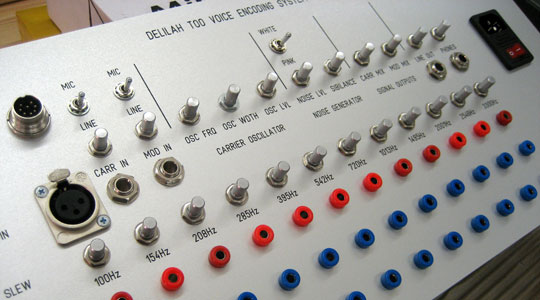Derek Holzer
[US/DE]

"Clipping, damping, amplitude compression, electronic differentiation, and integration of random speech — [the vocoder] produced an engineer’s parody of human speech. It was as if someone had taken it into his head to dismantle [the Black Sea towns of] New Athos or Gurzuf, put the material in little cubes in matchboxes, mixed them all up, flown the lot to [Siberia's] Nerchinsk, sorted them out, and reassembled them precisely as they were before, reproducing the subtropics, the sound of the surf, the southern air, and moonlight." – Alexandr Solzhenitsyn, The First Circle (1968)
Taking it's name from the advanced speech security system developed by the pioneering English computer scientist and cryptanalyst Alan Turing in the Second World War, "Delilah Too: An Archaeology of Privacy" presents a media-archaeological model of voice encryption as a method to protect privacy while still speaking in the public sphere. Technologically, "Delilah Too" is based on the voice scrambling capabilities of the vocoder, a device far better known for its role in the history of electronic music than for its cryptologic potential.
It is no small accident of history that both a persecuted gay man such as Turing, or an imprisoned political dissident such as the Russian author Aleksandr Solzhenitsyn, would be employed by their countries in the 1940s and 50s to create machines for encoding military and state secrets into a wall of broadcast noise. Each would have intuitively understood the need to converse in public without their intentions (political, sexual or otherwise) falling on the wrong ears.
A vocoder functions by breaking speech down into a number of frequency bands and analyzing the amount of energy present in each band. In a primitive, analogue version of the complex, bandwidth-saving algorithms used to encode MP3s and mobile phone conversations, this information is then sent to a synthesis module which reconstructs the speech. If the information channels of the vocoder are swapped around in different orders, the result may still resemble human speech in its cadence, but that of a speaker far from human. In this way, an “enciphered” version of speech can be transmitted as sound.
The "Delilah Too" installation itself is comprised of two private spaces (isolated sound booths), communicating through an enciphered acoustic channel through a public space (the exhibition space). Inside each private space is a matching vocoder-based enciphering and deciphering matrix, allowing private communication through the public space, where participants in the installation can hear and manipulate the enciphering process to affect the overall character of the sound they hear. However, they have no way to decipher the speech being transmitted.
Derek Holzer is an American instrument builder and sound artist based in Berlin, whose current interests include DIY analogue electronics, field recording, media archaeology and the meeting points of electroacoustic, noise, improv and extreme music.
Since 2002, Holzer has given almost 200 experimental sound performances, created scores of unique instruments and installations, and taught over 130 workshops in sound art, basic electronics, field recording, and pure data programming across Europe, North and South America, and New Zealand. One of his many notable projects is "Tonewheels," an experiment in converting graphical imagery to sound, in which transparent tonewheels with repeating patterns are spun over light-sensitive electronic circuitry to produce sound and light pulsations and textures. Inspired by some of the pioneering 20th century electronic music inventions and developed in residencies at Tesla in Berlin DE and STEIM in Amsterdam, the all-analogue set is performed live without the use of computers (using only overhead projectors as light source, performance interface, and audience display), and aims to open up the 'black box' of electronic music and video by exposing the working processes of the performance for the audience to see.
Holzer's recorded work has been released via the Nexsound, Mandorla, Sirr, and/OAR, and Gruenrekorder labels, and he has co-initiated several internet projects for field recording and collaborative soundscapes including Soundtransit.nl. In 2014 he was awarded a working grant from the Foundation of Lower Saxony at the Edith-Russ-Haus for Media Art in Oldenburg, Germany.
Holzer returns to CTM Festival following his presentation of "Probing the Past: A Media Archaeology of Handmade Electronic Sound" at the MusicMaker's Hacklab in 2014.
This project has been graciously supported by a grant from the Foundation of Lower Saxony at the Edith Russ-Haus 2014, with technical and logistical support by Jaanus Kalde, Carsten Stabenow, and Martin Kuentz.


